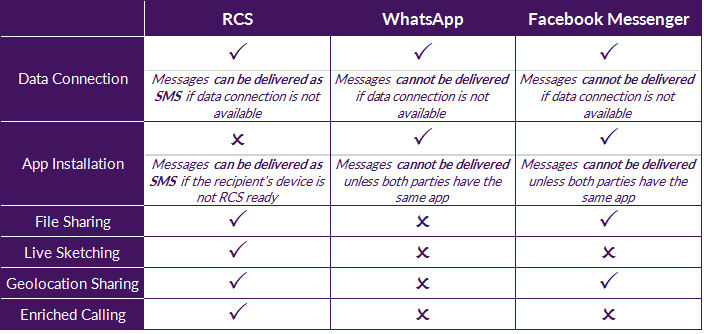
So first thing first, does RCS use data?
The short answer is yes. But it does have the option to interchange to SMS should data connection not be available. This makes it unique to all other OTT applications. So what else can RCS do and how does that compare to say WhatsApp and Facebook Messenger? Here is a brief comparison on some of the features:
There’s more unique features to RCS
RCS’s special features don’t just end here. For instance, companies can brand their messages with their own logo and branded colours. Other rich content like discount vouchers, boarding passes, loyalty cards, GIFs and tickets with dynamic fields can be also be included in the messages too. What’s more exciting is that it has some additional benefits missing with phone calls. For example, doctors who need to contact patients with important test results could add a brief description to the incoming call to provide context about the phone call to enable an informed decision to be made when answering the call.
So can we embrace RCS and ditch SMS now?
Well not so fast. Since the idea of RCS is to integrate with your existing SMS app to provide a richer communication experience, both your handset and network will need to support RCS. As of December 2016 there are only 156 Android devices and 49 mobile operators supporting RCS globally. In Australia, Telstra has been listed as a signatory along with other carriers worldwide. However, according to a recent article, there is still no formal launch plan from Telstra. And there aren’t any plans to adopt or roll out RCS by Optus or Vodafone Australia just yet. so we still have some way to go before RCS becomes the default native messaging application like SMS is now.
If not now, then when?
RCS falls under the umbrella of the GSMA’s “Universal Profile”, which aim to provide a single specification that will help simplify both product development and operator deployment for the next generation of mobile messaging and calling. There are currently 47 operators, 11 manufacturers and 2 OS providers that have committed to support the Universal Profile. That means RCS, being tied to the Universal Profile, will be included in any future communication services development by these supporters. In the second quarter of 2017, there will be additional release of RCS including:
- Developer APIs
- Plug-in Integration
- Improved authentication / app security
These are all good signs that RCS is moving along and we are one step closer to embracing it as the future of SMS.So what do you think readers? Are you excited about RCS? Would you embrace it with open arms? Share your thoughts and ideas with us in the comment section below.

